Building Automation Service Platform--zabbix Monitoring Platform
Preparatory environment
- Prepare a Linux host (CentOS 7 example)
- LAMP platform has been installed
- Close Firewall and SELinux
- Setting IP Address
- Setting up yum source
- Individual symbols in linux instructions will conflict with the text editing language of the blog. I will use spaces to separate them for easy reading, and the actual grammar will prevail.
Experiments begin
Preparing the zabbix Platform Environment
Server Address Settings
Change host name
[root@zabbix-server ~] hostnamectl set-hostname zabbix-server //Setting Host Name
Configure IP address
[root@ zabbix-server ~] nmcli connection modify ens33 ipv4.addresses 192.168.139.132 //Setting IP Address [root@ zabbix-server ~] nmcli connection up ens33 //Activate Network Card
Adding Host Mapping
[root@ zabbix-server ~] vim /etc/hosts 192.168.139.132 zabbix zabbix-server.com //Write the instruction on a separate line in vim
Check if you can ping the site you set up
[root@ zabbix-server ~] ping zabbix-server.com //The address that ping just wrote in vim PING zabbix (192.168.139.132) 56(84) bytes of data. 64 bytes from zabbix (192.168.139.132): icmp_seq=1 ttl=64 time=0.032 ms 64 bytes from zabbix (192.168.139.132): icmp_seq=2 ttl=64 time=0.034 ms
Install and enable LAMP platform
Install LAMP components
[root@ zabbix-server ~] yum -y install httpd mariadb mariadb-server php php-mysql //Installation package //Installed: httpd.x86_64 0:2.4.6-89.el7.centos mariadb.x86_64 1:5.5.60-1.el7_5 mariadb-server.x86_64 1:5.5.60-1.el7_5 php.x86_64 0:5.4.16-46.el7 php-mysql.x86_64 0:5.4.16-46.el7
Check if the installation is successful
[root@zabbix-server ~]# yum list httpd mariadb mariadb-server php php-mysql //Loaded plug-ins: fastest mirror, langpacks Loading mirror speeds from cached hostfile * base: mirrors.aliyun.com * extras: ap.stykers.moe * updates: mirrors.aliyun.com //Installed packages httpd.x86_64 2.4.6-89.el7.centos @updates mariadb.x86_64 1:5.5.60-1.el7_5 @base mariadb-server.x86_64 1:5.5.60-1.el7_5 @base php.x86_64 5.4.16-46.el7 @base php-mysql.x86_64 5.4.16-46.el7
Enabling LAMP Service
[root@zabbix-server ~] systemctl restart httpd mariadb //Restart service [root@zabbix-server ~] systemctl enable httpd mariadb //Set up boot-up self-start Created symlink from /etc/systemd/system/multi-user.target.wants/httpd.service to /usr/lib/systemd/system/httpd.service. Created symlink from /etc/systemd/system/multi-user.target.wants/mariadb.service to /usr/lib/systemd/system/mariadb.s
Setting up firewalls and SELinux
Close the firewall
[root@zabbix-server ~] systemctl stop firewalld.service //Close the firewall [root@zabbix-server ~] systemctl disable firewalld.service //Binary boot-up self-start Removed symlink /etc/systemd/system/multi-user.target.wants/firewalld.service. Removed symlink /etc/systemd/system/dbus-org.fedoraproject.FirewallD1.service.
Turn off the SELinux mechanism
[root@zabbix-server ~] setenforce 0 //Failure SELinux [root@zabbix-server ~] vim /etc/selinux/config //No Boot Up // Go into vim editing mode and change the value of the first SELinux # This file controls the state of SELinux on the system. # SELINUX= can take one of these three values: # enforcing - SELinux security policy is enforced. # permissive - SELinux prints warnings instead of enforcing. # disabled - No SELinux policy is loaded. **SELINUX=disabled** # SELINUXTYPE= can take one of three values: # targeted - Targeted processes are protected, # minimum - Modification of targeted policy. Only selected processes are protected. # mls - Multi Level Security protection. SELINUXTYPE=targeted
Installation and initialization of zabbix
Install zabbix related packages
Confirmation package
You can use XFTP to connect to CentOS 7 to upload the prepared zabbix-server file to the / root directory
Installing zabbix server dependency packages
[root@ zabbix-server ~] ls /root/zabbix-server/ [root@ zabbix-server ~] yum -y install zabbix-server/ *.rpm [root@zabbix-server ~] yum list "zabbix*" //Installed packages zabbix-agent.x86_64 3.4.15-1.el7 @zabbix zabbix-release.noarch 3.4-2.el7 installed zabbix-server-mysql.x86_64 3.4.15-1.el7 @zabbix zabbix-server-pgsql.x86_64 3.4.15-1.el7 @zabbix zabbix-web.noarch 3.4.15-1.el7 @zabbix zabbix-web-mysql.noarch 3.4.15-1.el7
Configuration Resolution Environment Change Time Zone
Modifying the web server configuration of zabbix
[root@zabbix-server ~] vim /etc/httpd/conf.d/zabbix.conf ... php_value date.timezone Asia/Shanghai //Delete # and change time zone to Shanghai ... [root@zabbix-server ~] systemctl restart httpd //Restart web Services
Initialize database connection
New zabbix Library Authorized User zabbix Access Password is pwd@123
[root@zabbix-server ~] mysql -uroot MariaDB [(none)]> create database zabbix character set utf8 collate utf8_bin; MariaDB [(none)]> grant all on zabbix.* to zabbix@localhost identified by 'pwd@123'; MariaDB [(none)]> quit;
Import the initial library provided by the zabbix service
[root@zabbix-server ~] zcat /usr/share/doc/zabbix-server-mysql*/create.sql.gz | mysql -uzabbix -ppwd@123 zabbix
Setting up database connection
[root@zabbix-server ~] vim /etc/zabbix/zabbix_server.conf ... DBName=zabbix //Database name DBUser=zabbix //Database users DBPassword=pwd@123 //Connection Password
zabbix monitoring interface
Open zabbix related services
Start zabbix-serer, zabbix-agent
[root@zabbix-server ~] systemctl restart zabbix-server zabbix-agent [root@zabbix-server ~] systemctl enable zabbix-server zabbix-agent
Confirm that the httpd website service is open
[root@zabbix-server ~] systemctl restart httpd
Access web Interface Initialization Settings
Visit the deployed zabbix monitoring system page
Access in Browser http://192.168.139.132/zabbix/
Click the Next Step button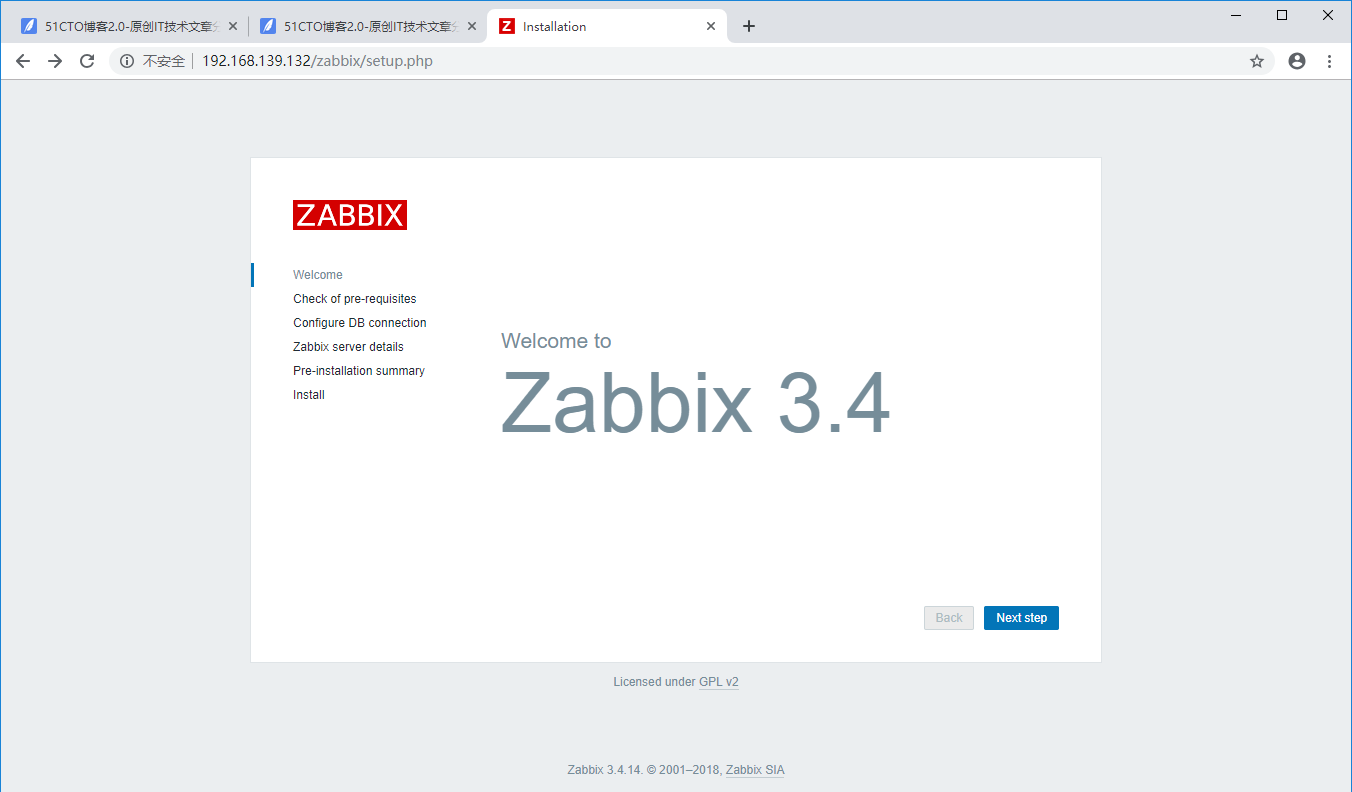
After confirming that the status is correct, click Next Step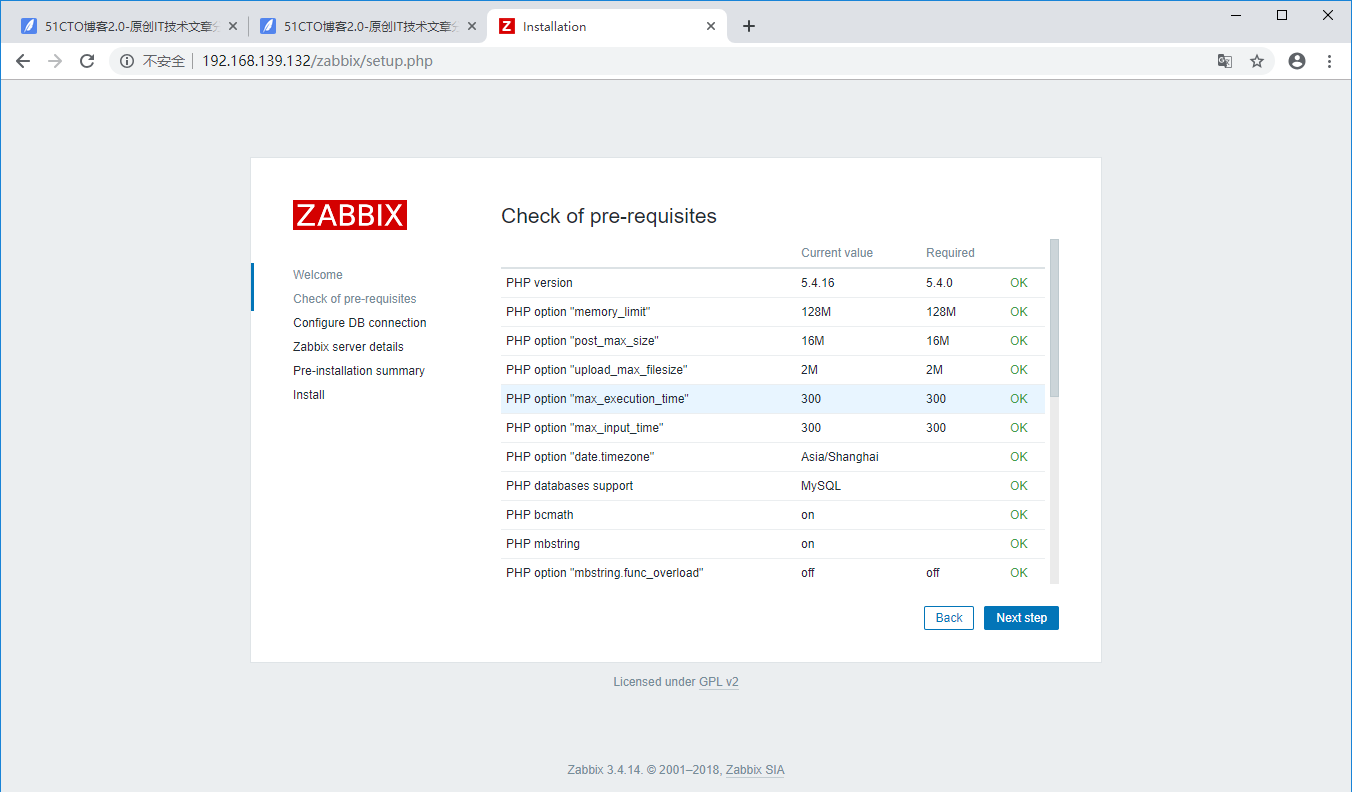
Set the library name zabbix, user name zabbix, password pwd@123 and click Next Step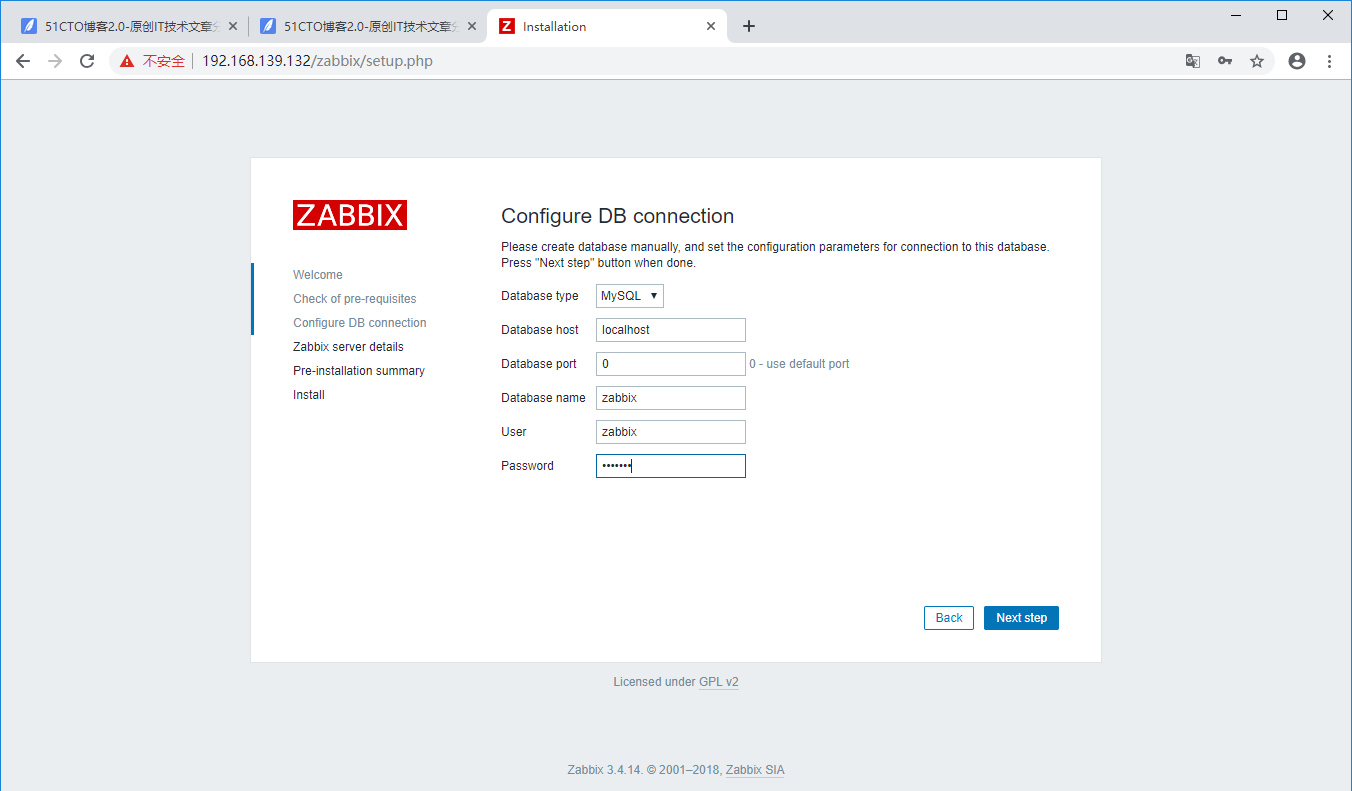
name here and click Next Step again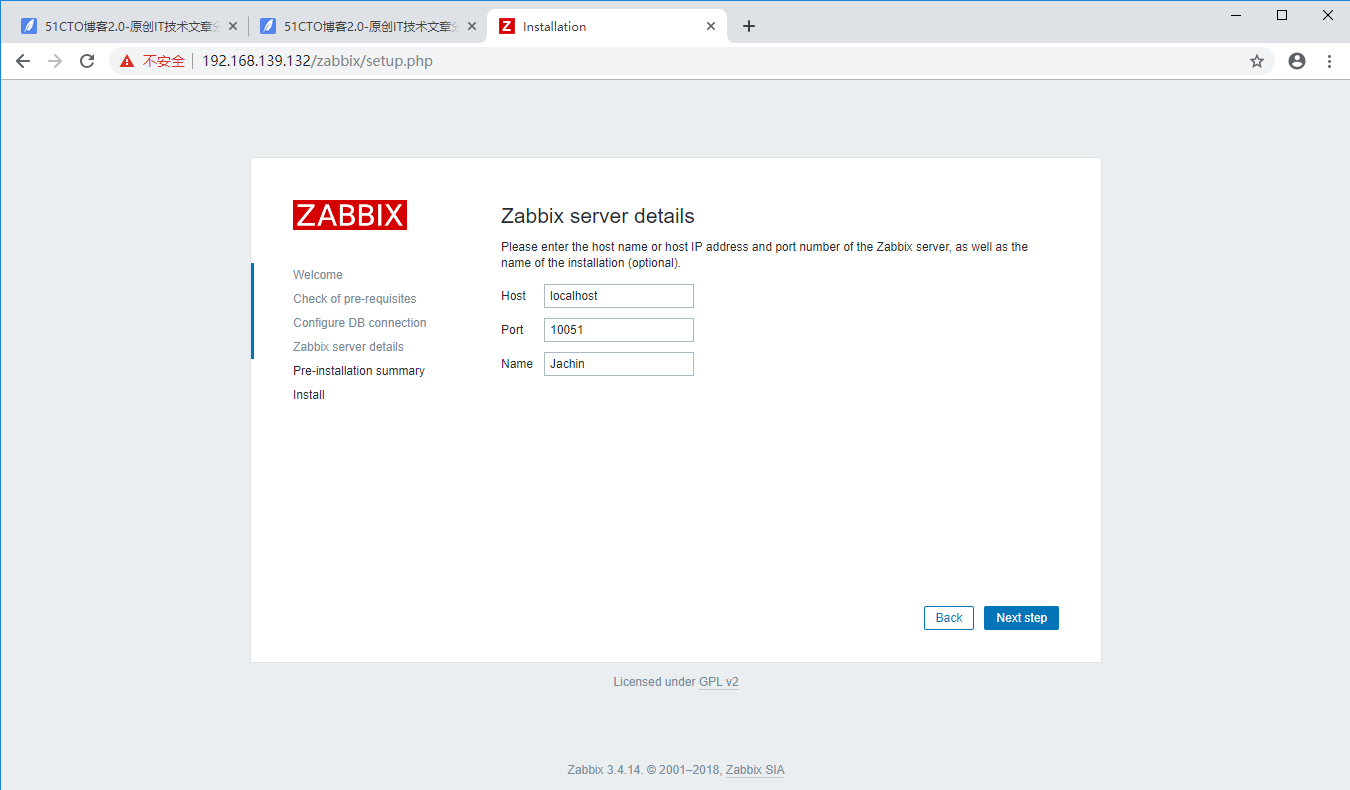
Next Step Point Finish Again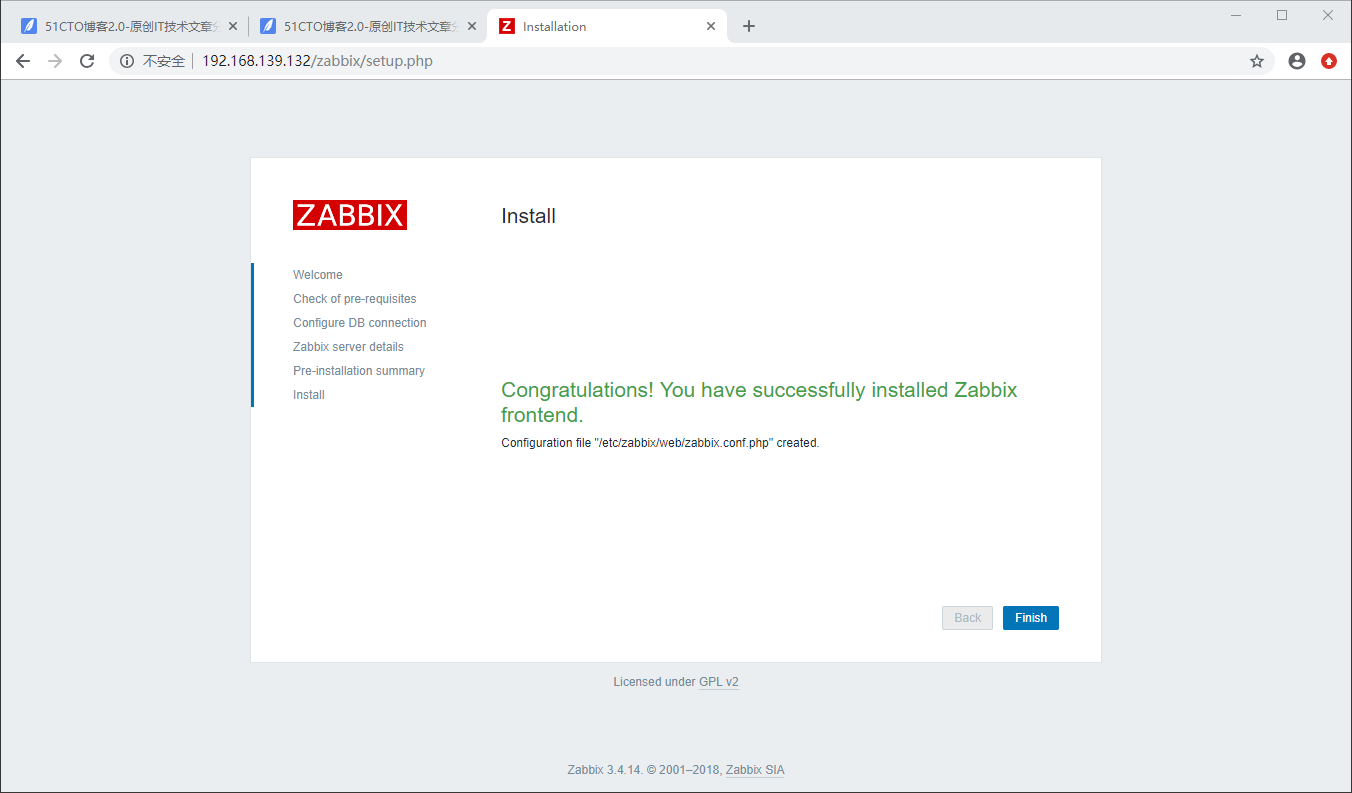
zabbix Foundation Settings
Go back to the login screen and start landing
Log in using the default administrator's account
Username: Admin
Password: zabbix
Display zabbix monitored pages after successful login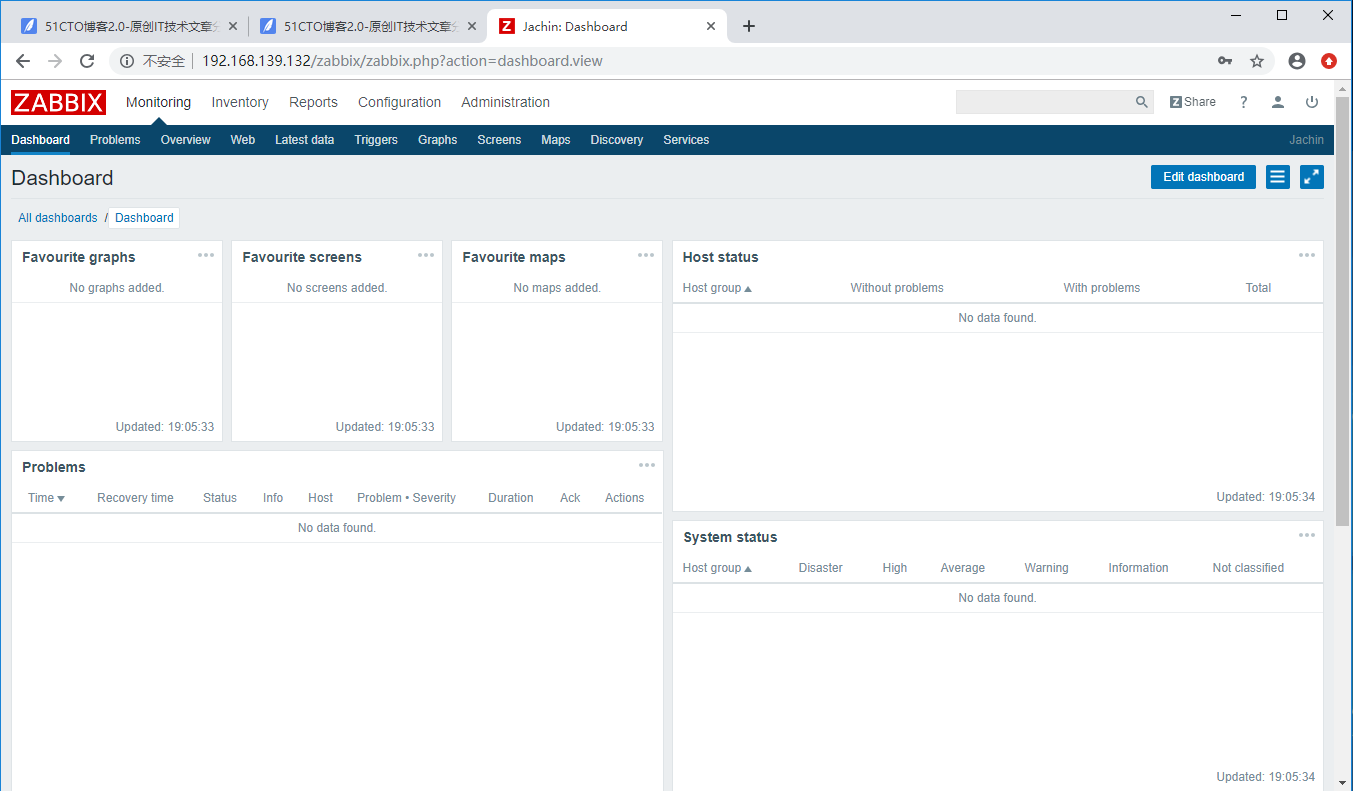
Change the language settings and click on the head logo at the top right of the zabbix monitoring platform
Select Chinese in the langue option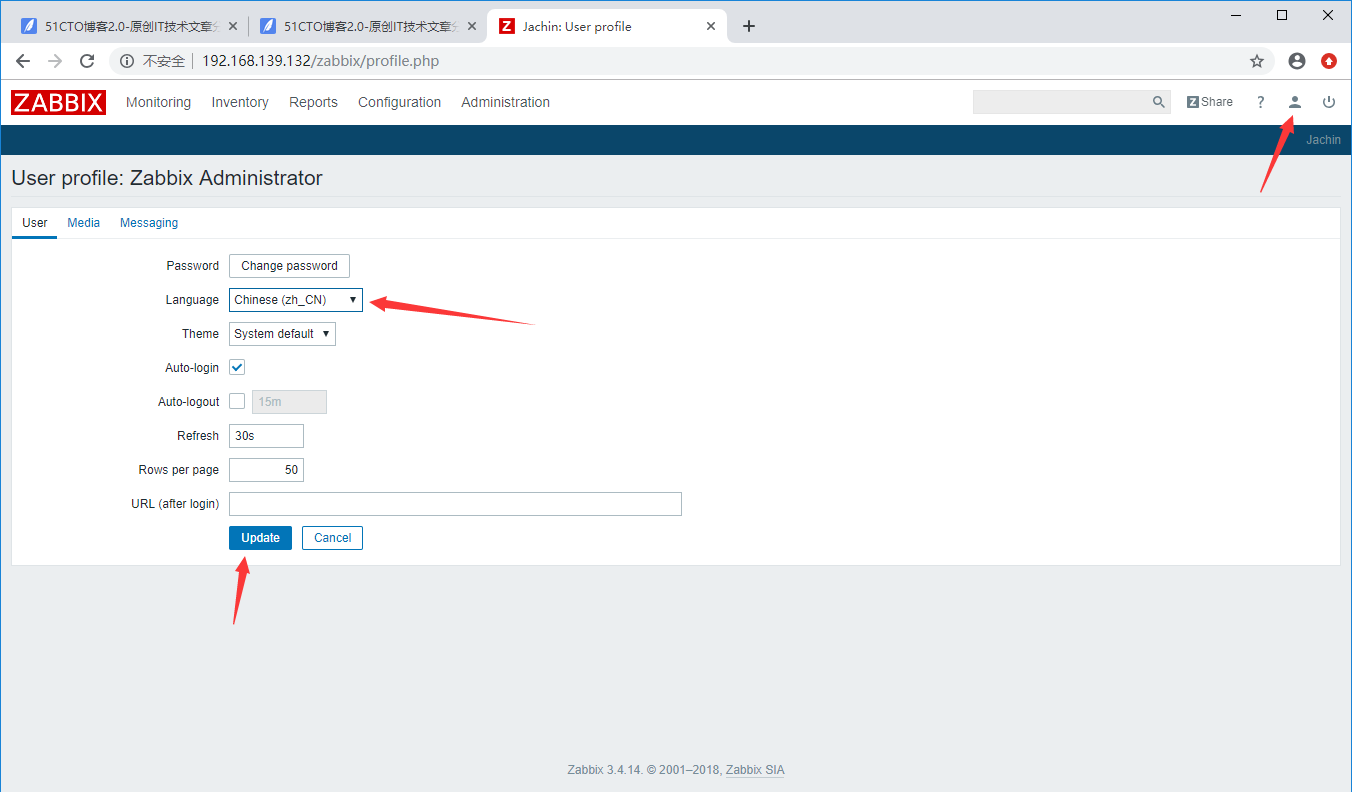
You can change a cool theme and select dark from the options just set in Chinese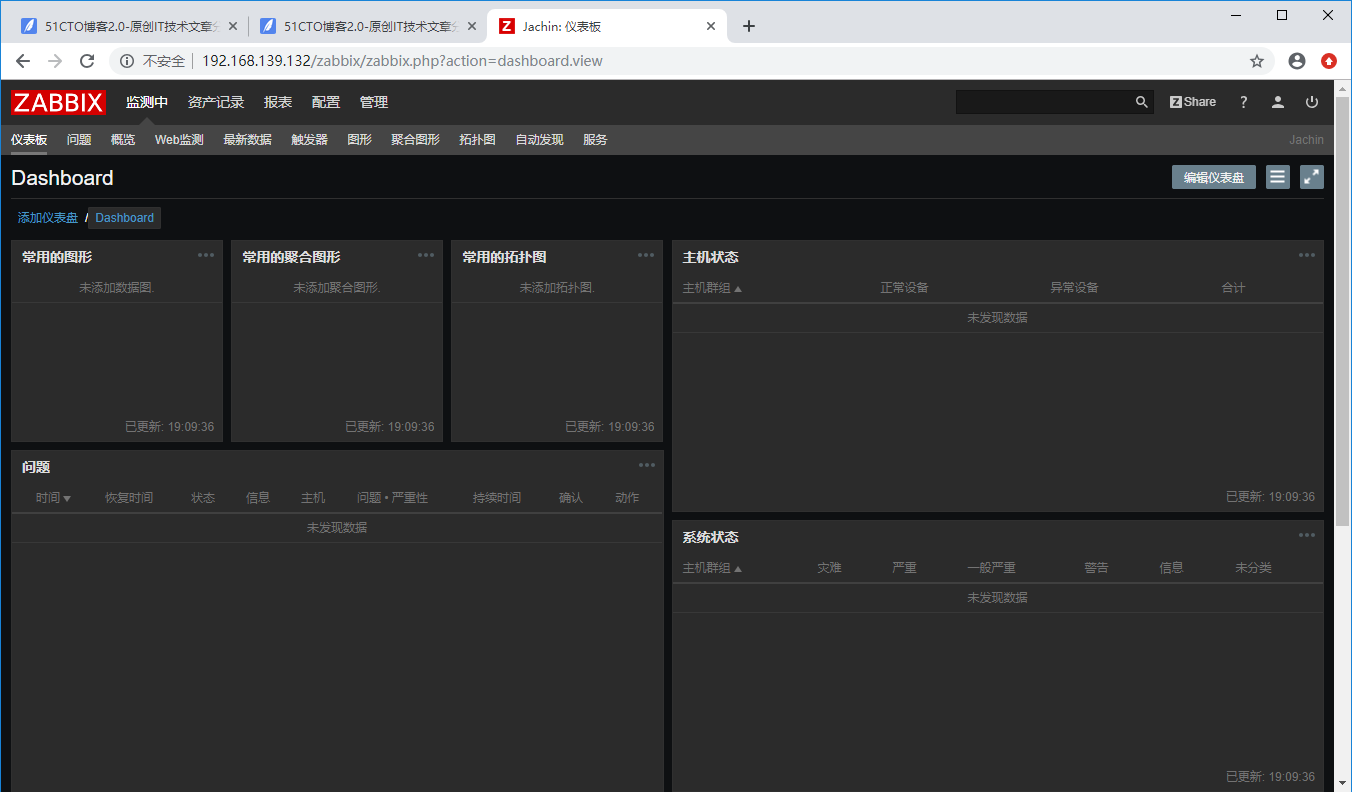
Common problem
The following are some of the questions I have personally met in recent days in the hope that you can avoid detours.
Prompt for errors in installing php services
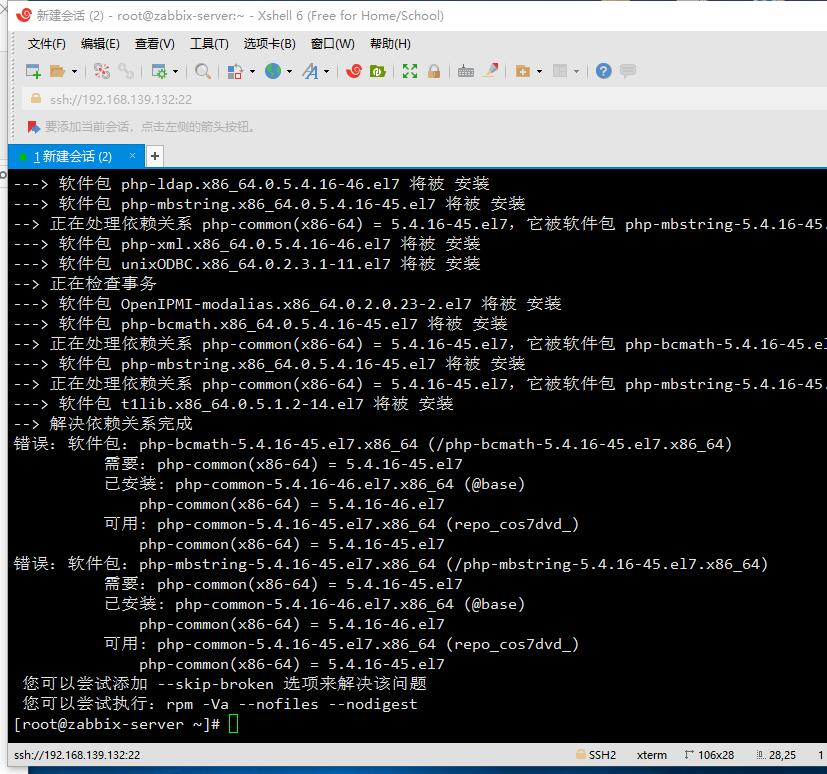
This may be a problem with the yum warehouse setup
Two Solutions
- Check that the command to set up the yum warehouse is correct
After setting up the yum source, make sure repolist checks to see that the data is not working properly
In Theory -- add without - repo is OK, but I just can't add it or not.
[root@zabbix-server ~] yum-config-manager --add-repo file:///repo/cos7dvd/
- Maybe it's a software dependency problem.
[root@zabbix-server ~] yum -y remove httpd-tools php-common mariadb-libs [root@zabbix-server ~] yum -y install httpd mariadb mariadb-server php php-mysql [root@zabbix-server ~] yum -y install postfix
Error installing zabbix-server package
This may be due to the inconsistency between the version of linux and the version of zabbix-server
CentOS version 7-1804 is nine packages with 16 versions. More packages need to be downloaded.
Error ERROR2002 when mysql-uroot logs in to the database
This error instruction should be that the database is not started
If this is still the case, it may be the same reason for the above problem.
In version 16, if the installation is not a mariadb package, it should be: mysql-community-server.x86_64
Solution:
[root@zabbix-server ~] wget http://dev.mysql.com/get/mysql57-community-release-el7-8.noarch.rpm [root@zabbix-server ~] yum localinstall mysql57-community-release-el7-8.noarch.rpm [root@zabbix-server ~] yum repolist enabled |grep "mysql.*-community.*" [root@zabbix-server ~] yum -y install mysql-community-server.x86_64 [root@zabbix-server ~] systemctl start mysqld [root@zabbix-server ~] systemctl status mysqld [root@zabbix-server ~] systemctl enable mysqld
Error ERROR3009 when entering database to set password
Since the database was upgraded, the data structure was not upgraded using mysql_upgrade after the upgrade was completed.
Solution:
[root@zabbix-server ~] mysql_upgrade -uroot
summary
Baidu has been stuck by the above problems for several days, and slowly pondered on them, Baidu only solved these problems, hoping to help you.
It's still necessary to build zabbix. Many companies are using zabbix, which is also a necessary skill for operation and maintenance.
The common mistake is that the source version of yum, which is often a minor problem, is easily overlooked.
If you have any questions or mistakes in the passage, you can comment or tell me by private letter.